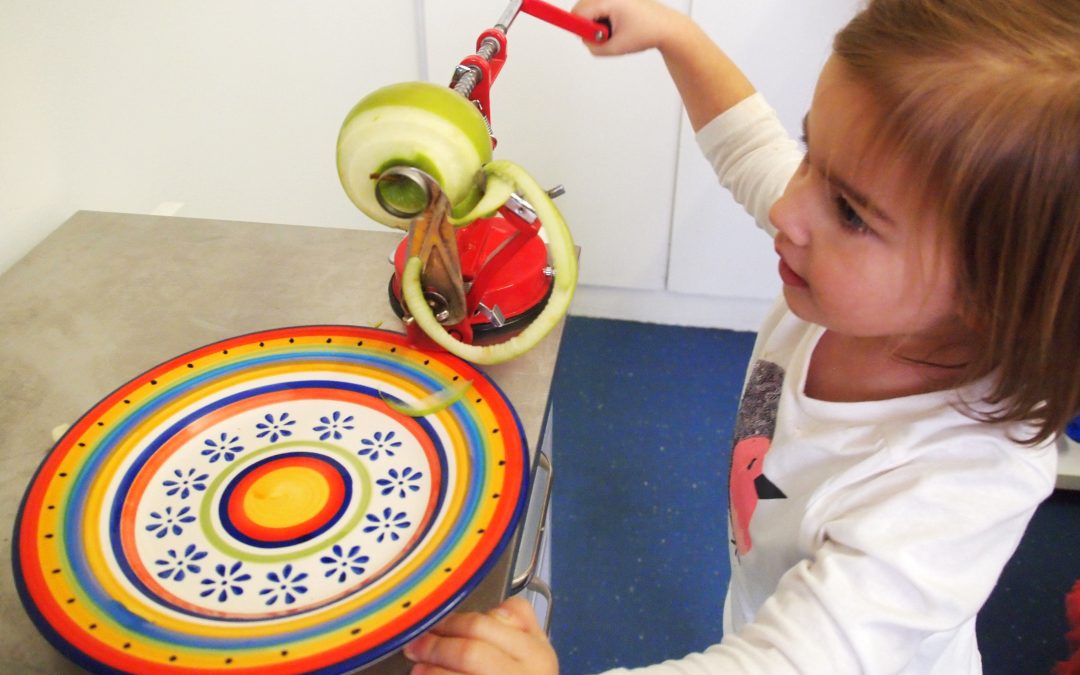Here are a few helpful hints for you to utilise and reinforce Practical Life skills and experiences with your child at home!
-Ask your child to help you with preparing meals or snacks.
We provide practice with utensils such as graters and vegetable peelers. A child who attends a Montessori Pre-school will have engaged with a range of materials used in spooning activities and recipes. This means that the child will most likely have a good control over spooning both fine materials and liquids. Ask them to utilise this by measuring out spoonfuls or cupfuls of ingredients. This has an added benefit of being a beautiful sensorial experience as it provides a chance for your child to taste, smell and touch a variety of ingredients.
By preparing healthy meals you can also take the opportunity to discuss the importance of nutrition. This is a great way to excite your child about healthy eating. They will not only be tempted by the aromas they find while cooking but will also connect healthy food with a happy, fun experience.

-Ask your child to help you with preparing meals or snacks.
We provide practice with utensils such as graters and vegetable peelers. A child who attends a Montessori Pre-school will have engaged with a range of materials used in spooning activities and recipes. This means that the child will most likely have a good control over spooning both fine materials and liquids. Ask them to utilise this by measuring out spoonfuls or cupfuls of ingredients. This has an added benefit of being a beautiful sensorial experience as it provides a chance for your child to taste, smell and touch a variety of ingredients.
By preparing healthy meals you can also take the opportunity to discuss the importance of nutrition. This is a great way to excite your child about healthy eating. They will not only be tempted by the aromas they find while cooking but will also connect healthy food with a happy, fun experience.
– Provide a set of cleaning tools on a low, safe shelf where your child can access them independently.
At Pre-School we encourage the children to use a dustpan and brush and brooms to tidy their own spills as well as sponges and towels for cleaning and drying any liquid messes. By replicating this in your own home your child will be free from having to rely on you to clean up for them or provide them with the tools each time they need to use them. Not only will you not have to clean up for them, but you may never have to realise there was a mess to begin with!


-Organise your child’s room with low, open shelving.
Children have an innate sense of order but they need to be given the opportunity to develop and utilise this. If their belongings are hidden out of their sight and reach then it is difficult for them to mentally organise the space. Often a child will create a mess simply because they are not aware of the proper space for that object to belong once it is finished with. Open, low shelves help your child visualise and later recall the order of the items which belong there. Ask your child to help you choose the placement to begin with so the system makes sense to them.
If you recognise that at Pre-School your child responds to the routine of putting trays away when they have finished using it then you may like to use trays as a guide at home. You might also consider using ‘floor mats’ or something similar. Giving a visual cue of where their personal space begins and ends helps a child to visually narrow down their field of vision to keep track of all their materials. It will also make them feel that you respect their work and workspace. This will then help your child develop a sense of respect for the times when a parent might need personal work space. Explain to them that a study or desk is to a parent what a green mat is to the child.
-Check your cutlery drawers and tool boxes.
There is a good chance that throughout your house is a huge range of exciting tools and materials just waiting to be used. Many of our Practical Life activities are simply use common, everyday tools and a little bit of imagination. Rather than relying on store bought toys or games for your child at home you can spend time creating practical exercises for your child to work with.

Consider these simple factors in preparing an activity:
- Make sure the task is achievable for your child. The object of a Practical Life tray is to provide a new skill for your child to master or to refine an existing skill. The task can be challenging, but it is important that it is not impossible as you do not want to set your child up for failure. Try the materials first so you know that the pieces fit and the tools work.
- Ensure that there is an opportunity for repetition within the activity. When a child enjoys an activity they will repeat this many times without tiring until they feel an internal sense of satisfaction. Try to make sure that the tray or activity can be independently reset and repeated by your child so that they can become absorbed in their continued work. This will help your child to increase their concentration span.
- Carefully consider the purpose of the activity. Keep in mind that the name of this area of work is Practical Life. There are added benefits such as increased levels of concentration and refinement of fine motor skills but the foundation of this work is to prepare the child for succeeding when faced with practical tasks in their real life. Observe your child to see where they might require some help in mastering a day to day objective. If they are having trouble turning on a tap then prepare an activity that focuses on screwing and turning, such as tightening a nut onto a bolt. If your child is unable to replace lids on textas or containers then create an activity that helps refine this skill. Jars or bottles can be washed then the lids and bottles can be separated and put out so that your child can sort and replace the lids.
- Always ensure the activity is safe! I am sure this does not need to be said to parents, the greatest protectors a child can have, but it is worth underlining this issue. It is a vital consideration to us as Montessori teachers preparing activities at Pre-School. Nothing goes on the shelf without being played with, pulled and pushed to check that it is as safe as possible.

